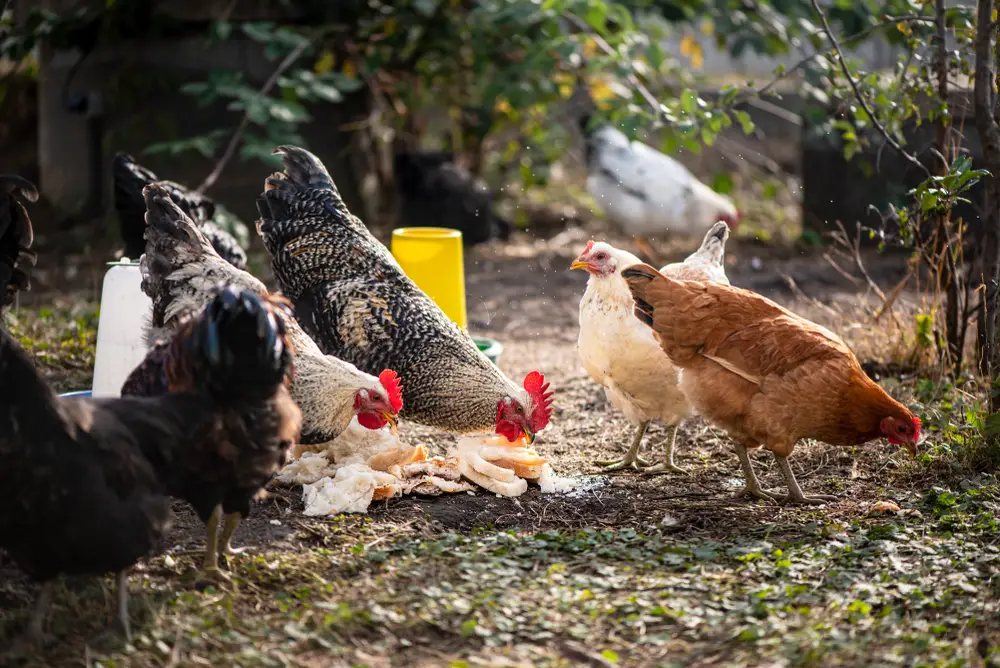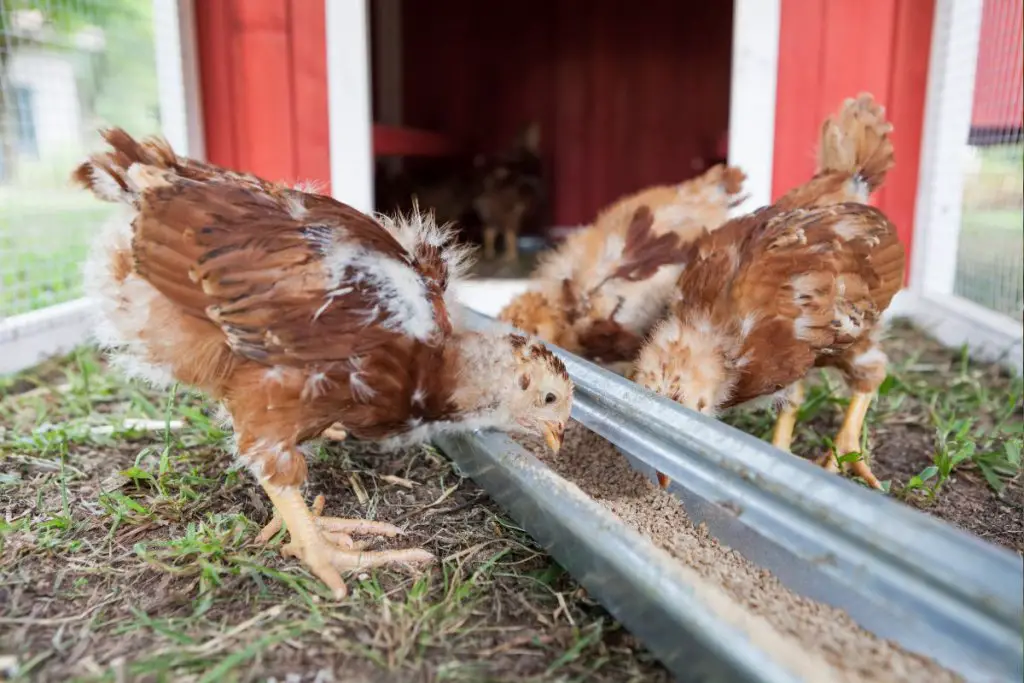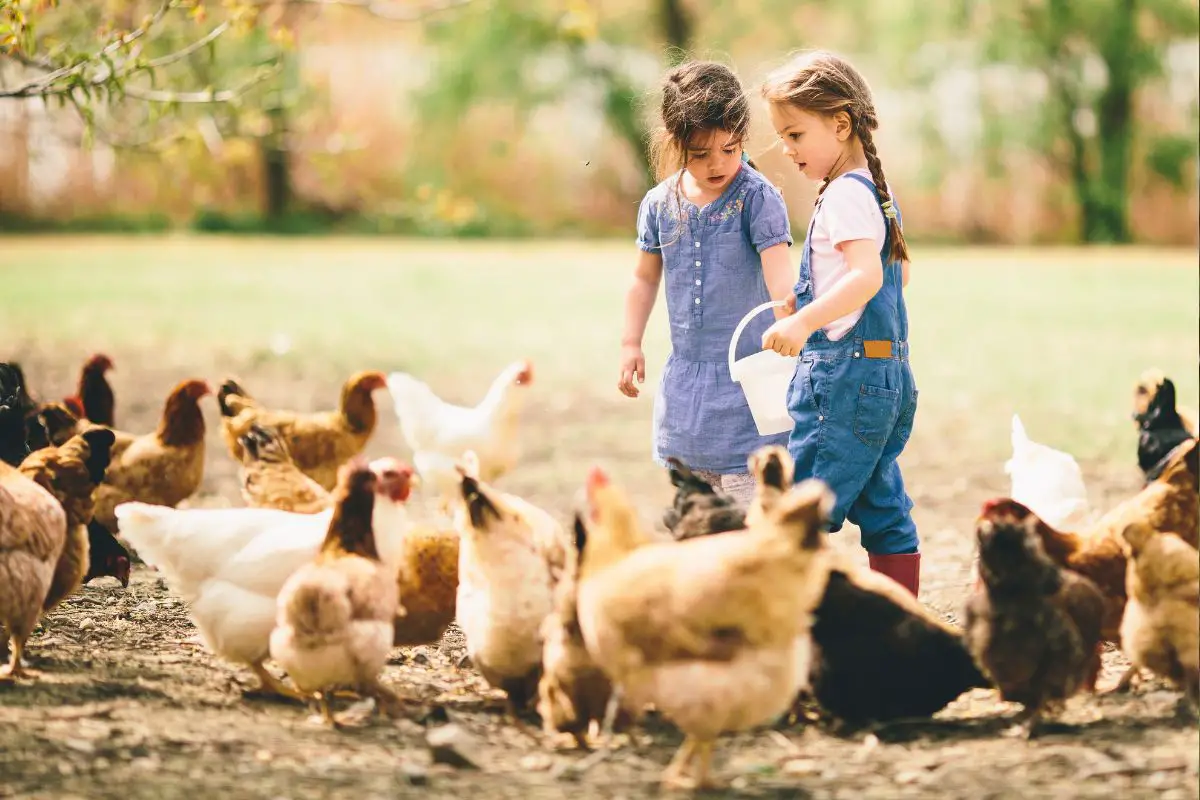Chickens can safely eat fresh bread but only in small quantities. You should never feed them moldy, stale or rotten bread, while baby chicks shouldn't be given any type of bread.
Feeding your flock leftovers from the dinner table is a common practice, but chicken keepers should be aware of what they are giving their chickens. While feeding them kitchen scraps is usually okay, you need to make sure that the food is healthy for chickens to eat.
If bread is a typical part of your diet, it’s important to know whether or not feeding leftover bread to your chickens is healthy. In this article, we will look at how bread affects a chicken’s digestive system.
Table of Contents
Safe to Eat, But Only In Small Quantities
It is important to first note that bread isn’t toxic to chickens. If fed to them in small quantities, it is usually safe for you to give your chickens bread.
However, stale or rotten bread shouldn’t be fed to your chickens. As is true of all moldy food, eating bad bread will likely lead to your chickens becoming sick. Chances are if you wouldn’t eat the food because you’re worried it’s not good anymore, then you shouldn’t feed it to your flock.
Moldy bread should always be thrown out, or alternatively composted, as the mycotoxins that are present will lead to sickness if consumed.
Bread should never be the primary source when feeding chickens, as it lacks a lot of the key nutrients that chickens need. Additionally, big chunks of bread or crusts are known to get caught in the crop of the chicken. Bread is both fluffy and will expand when eaten, so it is very easy for it to get stuck in the crop before continuing through the digestive system.

Ultimately, it is best to keep the amount of bread that your chickens eat to a minimum. Even though it isn’t toxic, the risks of other health issues arising from bread consumption outweigh its minimal nutritional value.
Baby Chicks Shouldn’t Eat Bread
Young chicks need to have a well-balanced diet that’s high in protein in order for them to grow into healthy chickens. Beyond carbohydrates and being high in calories, bread, unfortunately, lacks a lot of the key nutrients that baby chicks need.
On average, white bread is usually about 7% protein percentage, whereas a high protein chick starter feed can be around 20% protein percentage. Wheat bread has a slightly higher protein percentage at about 9%, but it still doesn’t compare to other high protein options. Chicks will rely on their feed for at least 90% of their dietary intake, with the rest being what you allow them to potentially forage for with their mother hen.

Eventually, when the chicks get old enough to start eating other foods outside of their high protein feed they will need to start intaking grit. Grit is tiny particles of stone and gravel that chickens need to help with the digestion of their food. While fully grown chickens can naturally acquire grit from around the yard as they forage, baby chicks will usually need commercially made grit provided to them.
Chicks will eventually reach an age where they can start having small food treats that aren’t their feed. It’s usually best to feed your chicks small pieces of fruits or veggies, as they will be easiest for their young digestive systems to process.
Risks to Digestive System
As mentioned previously, bread can be a risk to a chicken’s digestive system. Bread can cause crop impaction and slow the digestive system, both of which are severe health risks. Regardless of the different types of bread available, bread is generally not easily digested by chickens.
Crop impaction occurs when food gets stuck in the chicken’s crop, and won’t continue through the rest of the digestive system. This causes blockages that will reduce how efficient the digestive system is, and will lead to the chicken not getting the nutrients that they need and possibly becoming sicker with conditions such as thrush.
An impacted crop will usually make your chicken grow incredibly lethargic and they will likely start to lose weight. Since the chicken isn’t digesting their food as they normally should, they aren’t getting the nutrition they need and their health will suffer as a whole.
If you notice that your chicken is having issues with crop impaction, the following simple solution could fix the problem. If bread is the culprit for the blocked crop, simply giving your chicken lots of water to drink and gently massaging the crop could cause the blockage to disintegrate and break down. Of course, it is best to seek a veterinarian’s help if the crop impaction doesn’t seem to improve after treatment at home.
Healthy Alternatives
Even though pieces of bread aren’t the best option for chicken treats, there are a wide variety of healthy foods to choose from.
| Berries, specifically blueberries, raspberries, and strawberries | They are incredibly rich in vitamins and antioxidants and are easy for chickens to digest. When they are free-range, chickens are often attracted to berry plants and will go out of their way to pluck berries straight off the bush. |
| Leafy greens | These also make for an excellent snack and are full of nutrients that are known to help hens produce healthy egg shells. Spinach, kale, collards, and chard are a few excellent examples of leafy greens that your chickens will love. |
| Mealworms | Another fantastic source of protein for chickens and are usually readily available wherever you purchase your feed. Insects and bugs are a natural part of a chicken’s diet, and so will not negatively affect a chicken’s digestive process. Mealworms will quickly become a favorite treat for your flock, and make for an excellent protein supplement. |
| Yoghurt | While this might not be at the top of your list when you think of things to feed your chicken, yogurt is rich in protein, vitamin B12, and calcium. Yogurt is a great probiotic to help chickens with digestion and is also known to promote healthy egg production in hens. When feeding yogurt to chickens make sure to use a variety that is sugar-free, as they do not need to be fed excess sugars |
Chickens have a complex digestive system that is able to break down a wide variety of foods, so there are many types of tasty treats that they can eat.
In Summary
Chickens are usually fine with eating small quantities of bread, but the risks of digestive issues and crop impaction should always be considered when giving your flock snacks. With so many other chicken foods that are both safe and healthy for chickens to consume, it’s often best to leave the bread and table scraps you have in the kitchen.
Both baby chicks and fully grown chickens benefit most from a varied and nutritious diet, so what you feed them should be deeply considered to make sure they stay happy and healthy.

